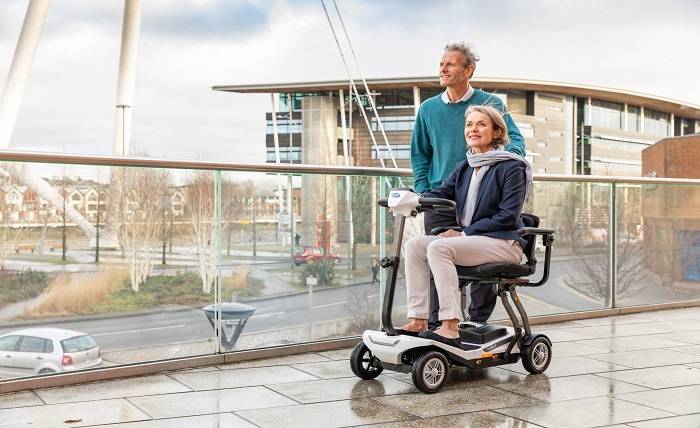
Mobility scooters are electric vehicles designed to assist people with mobility impairments or disabilities to get around. They are often used as an alternative to manual wheelchairs and can be a valuable tool for increasing independence and mobility.
Mobility scooters typically have a seat, handlebars, and a platform for the user’s feet. Some models are small and portable, while others are more substantial, with features such as suspension, lights, and turn signals.
Who Should Use a Mobility Scooter?
Mobility scooters are generally recommended for people with difficulty walking or standing for long periods due to a physical impairment or disability.
They can be a helpful tool for individuals who have difficulty with balance, have arthritis or other joint problems, or have a neurological condition that affects their mobility.
What Kind of Batteries Do Mobility Scooters Use?
Most mobility scooters use sealed lead-acid rechargeable batteries, which can last for several years with proper maintenance.
Some newer models may use lithium-ion batteries, which are lighter and more energy-efficient, but may be more expensive to replace.
Finding batteries for mobility scooters when they need replacing is usually straightforward. However, it’s always worth discussing with a professional engineer what you need and how to fit them.
Are Mobility Scooters Road Legal in the UK?
In the UK, mobility scooters are classified as Class 2 invalid carriages, which means that they are not legally considered motor vehicles and are not subject to the same regulations as cars or motorcycles.
However, they are required to be used on the pavement (sidewalk) unless there is no pavement available, in which case mobility scooters may then be used on the road. Mobility scooters must be used with due care and attention, and users are encouraged to undergo training before operating them.
It is also important to note that mobility scooters are not permitted on motorways or certain types of footpaths, such as those in pedestrianized areas.
Mobility scooters can vary in size, features, and capabilities, so it’s essential to consider your specific needs and circumstances when choosing one.
Here are some key things to consider:
- Size and portability – Consider your needs and the space you have available to store and transport the scooter.
- Range and speed – Mobility scooters typically have a maximum speed of around eight mph (13 km/h) and a range of approximately 20 miles (32 km) on a full battery charge.
- Comfort and convenience – Look for a scooter with a comfortable, adjustable seat and handlebars, and consider features such as a basket or storage compartment for carrying personal items. Some scooters may also have features such as a horn, turn signals, and lights for improved visibility and safety.
- Ease of use – Consider the scooter’s ease of use and maintenance. Some models may have features such as easy-to-use controls and a simple, easy-to-maintain design.
- Cost – Mobility scooters can vary significantly in price, depending on the size, features, and capabilities of the model. Consider your budget and the features that are most important to you when choosing a scooter.
It’s also a good idea to test out a few different models before purchasing to get a feel for what works best for you. Some mobility scooter dealers or manufacturers may offer demo models you can try out before deciding.




